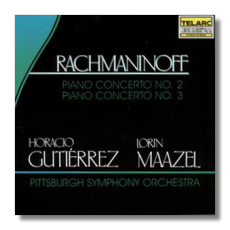
The Internet's Premier Classical Music Source
Related Links
- Rachmaninoff Reviews
- Latest Reviews
- More Reviews
-
By Composer
-
Collections
DVD & Blu-ray
Books
Concert Reviews
Articles/Interviews
Software
Audio
Search Amazon
Recommended Links
Site News
 CD Review
CD Review
Sergei Rachmaninoff

Piano Concertos
- Concerto #2 in C minor, Op. 18 (1901)
- Concerto #3 in D minor, Op. 30 (1909)
Horacio Gutiérrez, piano
Pittsburgh Symphony Orchestra/Lorin Maazel
Telarc CD-80259 Time: 73:11 DDD
When a record outfit with the resources of Telarc takes on a mainstay such as the "Rach Three," we practically expect the outcome to be the new digital reference for that work. Their track record, as far as sound quality, is that good. They don't skimp on artistic talent either: Horacio Gutiérrez has been recording at a rapid pace of late, commensurate with his talent I think. As technique and elegance go, he's the Itzhak Perlman of the piano, working miracles with a minimum of apparent effort. Maazel was the conducting prodigy, who at fifteen led teenager Byron Janis on a romp through the Rachmaninoff Second. Today he's considered "temperamental."
In music that is all about temperament, Maazel and Gutiérrez choose to play it safe. Granted, some of the tempos they take would have lesser pianists bleeding over the keys, but Gutiérrez always has it well in hand – whether it's the power chords of the Alla breve are hammered out with ease. The cadenza (he plays the abridged version) thunders politely. There was a potential in this recording for complete mayhem, the kind of emotional volatility that makes Sviatoslav Richter's Second and Earl Wild's Third spine-tingling. Not that I believe that a great performance must strike fear in the listener, but there should be a moment when the audience is transported unexpectedly, a Busonian moment when the music "dematerializes" and is all around us.
I have some minor quibbles. In the Third Concerto, the developmental material of the first movement, when it does not concern the piano, is pushed along at a faster tempo. Does Maazel find these transitions academic? Immediately preceding the cadenza, he gives the eerie falling motif in the strings short shrift by waving the players on through. Gutiérrez doesn't get the critical silence he needs before the cadenza erupts.
Though it fell short of conjuring ecstatic moments for me, this record sustains a high level of involvement. I don't doubt many pundits would prefer it over the versions I've mentioned, because it doesn't take those risks: no jabbing accents, no bass notes pounded like depth charges, but plenty of exquisite virtuosity.
Copyright © 1997, Robert J. Sullivan




















